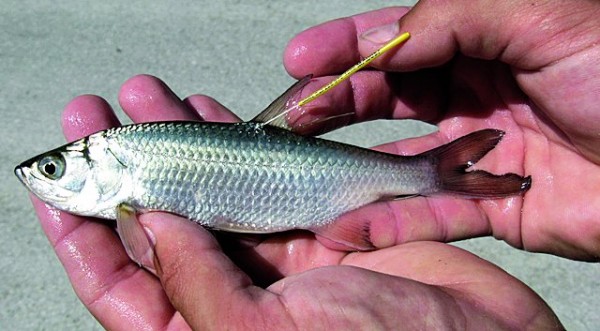The juvenile tarpon research initiative at Wildflower Preserve officially kicked off in September 2012 when DNA samples were taken from 43 tarpon netted in Lemon Creek. Lemon Bay Conservancy is partnering with Mote Marine and the Bonefish and Tarpon Trust on a multi-year study of tarpon in the creek system at Wildflower. Dr. Aaron Adams is leading the project. University of Florida graduate student JoEllen King is coordinating the monthly fish sampling work and data analysis.
Development of coastal areas has caused many mangrove backwaters like Lemon Creek to be lost or degraded. That’s a major concern because these protected mangrove areas play a very important role in the life cycle of tarpon and many other species. Tarpon are born 100 miles out in the Gulf of Mexico. By instinct, the tiny fish (called leptocephalus larvae) find their way back to the shoreline and into protected creeks and waterways. In these backwaters, the young tarpon feed and grow for about two years before heading to more open waters.
When the tarpon are netted for the study, they are quickly placed in a holding tank. Each fish is measured and a DNA sample is taken. For tarpon over 19 cm in length, a small RFID (radio frequency ID) tag is inserted into the fish. These tags, similar to those used for pets, provide a unique identifying code for each individual tarpon. As soon as the analysis work is complete, the young fish are quickly returned unharmed to the creek.
The objectives for the study are to gain an understanding of the tarpon populations in the creek and to learn how many juveniles leave the creek to return to LemonBay and more open waters. With the cooperation of the Lemon Bay Golf Course, an RFID antenna has been mounted above Lemon Creek near the point where it meets the bay. The antenna and a linked recording system will pickup the RFID signals of passing tarpon and log that information for the study.
If you would like to assist with this initiative by donating toward project funding or assisting with fish sampling, please call the LBC office at 941-830-8922. – See more at: http://www.thefishingwire.com/story/309595#sthash.2a4jYUuo.dpuf










